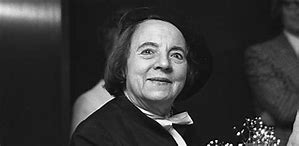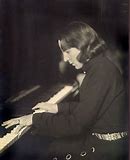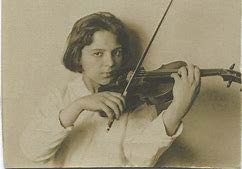Sophie-Carmen Eckhardt- Gramatté
Dr. Sophie-Carmen Eckhardt-Gramatté (b. Moscow, USSR, 6 January 1899; d. Stuttgart, Germany, 2 December 1974) received her early training in piano from her mother, a pupil of Nicholas Rubinstein, and continued piano as well as violin studies at the Conservatoire in Paris. At the age of eleven she made a double début on the violin and piano and by 1919 was performing concerti on both instruments. Living in Berlin from 1914, she studied with Bronislaw Huberman. In the twenties she toured with Edwin Fischer as a two-piano team. In 1920 she married the painter Walter Gramatté. In 1929, after the death of Gramatté, she embarked on an American tour, playing her own works with Stokowski (Philadelphia) and Stock (Chicago). In 1934 she married the art historian Ferdinand Eckhardt. From 1936-42 she studied with Max Trapp at the Preussische Akademie in Berlin, turning almost exclusively to composition.
Eckhardt-Gramatté created a dense, aggressive style that was much closer to, and dependent on, late romanticism than on twentieth-century techniques. Her use of dissonance was a logical development from post-Wagnerianism, although it never reached the emotional atonality of the Viennese masters (Schoenberg, Berg, and Webern). Nevertheless, one detects some characteristics, especially in the style of her early works, that “show(s) a lively mind in grips with modern tendencies and using high technical accomplishments in exploiting the resources of a new and musicianly polyphony.” — Grove Dictionary of Music and Musicians, 1954.
Her Suite VI for solo piano consists of three pieces spanning three decades (1928-52), from which it is possible to obtain a capsule view of her style. All three pieces are similar in having a relentless forward drive with few breathing spaces and with a high degree of emotional intensity and excitement.
After settling in Winnipeg in 1954, Eckhardt-Gramatté composed works on many commissions and continued a very active musical life. In 1970 she received both an honourary doctorate in music from the University of Brandon and the title of professor from the Minister of Education, Vienna, Austria. In 1974 she was the first Canadian composer to receive the Diplôme d’Honneur and shortly before her death, the CBC produced a two-hour documentary of her life.1
1 Contemporary Canadian Composers; Edited by Keith MacMillan, John Beckwith; Published by Oxford University Press, 1975, pp. 62-63.



